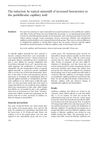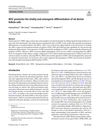 25 citations,
March 2017 in “Journal of Dermatological Treatment”
25 citations,
March 2017 in “Journal of Dermatological Treatment” Platelet-rich plasma treatment for non-scarring hair loss shows mixed results and needs more research.
 24 citations,
July 2019 in “Cochrane library”
24 citations,
July 2019 in “Cochrane library” Some treatments like methotrexate with prednisone might help juvenile morphea, but more research is needed to confirm.
[object Object]  24 citations,
July 2018 in “Stem cells”
24 citations,
July 2018 in “Stem cells” Runx1 controls fat-related genes important for normal and cancer cell growth, affecting skin and hair cell behavior.
 24 citations,
May 2016 in “Stem Cell Reviews and Reports”
24 citations,
May 2016 in “Stem Cell Reviews and Reports” The document concludes that understanding how adult stem and progenitor cells move is crucial for tissue repair and developing cell therapies.
 23 citations,
December 2020 in “Frontiers in Cell and Developmental Biology”
23 citations,
December 2020 in “Frontiers in Cell and Developmental Biology” Gene network oscillations inside hair stem cells are key for hair growth regulation and could help treat hair loss.
 23 citations,
July 2018 in “BMC Complementary and Alternative Medicine”
23 citations,
July 2018 in “BMC Complementary and Alternative Medicine” Certain herbal combinations in traditional Chinese medicine might be effective for treating hair loss, focusing on liver or stomach health.
 23 citations,
June 2018 in “Facial Plastic Surgery”
23 citations,
June 2018 in “Facial Plastic Surgery” Platelet-Rich Plasma (PRP) is a low-risk treatment for Androgenic Alopecia (AGA) that generally improves hair count or density, but more research is needed for optimization.
 21 citations,
January 2018 in “The Korean Journal of Physiology and Pharmacology”
21 citations,
January 2018 in “The Korean Journal of Physiology and Pharmacology” Modified stem cells from umbilical cord blood can make hair grow faster.
 21 citations,
January 2003 in “Skin pharmacology and physiology”
21 citations,
January 2003 in “Skin pharmacology and physiology” Different skin cells process testosterone differently, and certain drugs can change this process, possibly helping treat acne and hair loss.
 20 citations,
February 2019 in “Genes”
20 citations,
February 2019 in “Genes” The study concludes that mutations in the AEBP1 gene can cause a form of Ehlers-Danlos syndrome and should be considered in diagnosis.
 19 citations,
August 2019 in “Seminars in Plastic Surgery”
19 citations,
August 2019 in “Seminars in Plastic Surgery” Platelet-rich plasma is beneficial in various plastic surgery applications, but more research is needed to standardize its use.
[object Object]  18 citations,
November 2020 in “Frontiers in Cell and Developmental Biology”
18 citations,
November 2020 in “Frontiers in Cell and Developmental Biology” Inflammation plays a key role in activating skin stem cells for hair growth and wound healing, but more research is needed to understand how it directs cell behavior.
 18 citations,
December 2018 in “Expert Opinion on Biological Therapy”
18 citations,
December 2018 in “Expert Opinion on Biological Therapy” Hair follicle stem cells are promising for wound healing but require more research for safe clinical use.
 18 citations,
August 2018 in “Facial Plastic Surgery Clinics of North America”
18 citations,
August 2018 in “Facial Plastic Surgery Clinics of North America” Lasers, microneedling, and PRP improve skin rejuvenation and repair, with PRP enhancing the effects when combined with other treatments.
 17 citations,
December 2019 in “Stem Cell Research & Therapy”
17 citations,
December 2019 in “Stem Cell Research & Therapy” Grouping certain skin cells together activates a growth pathway that helps create new hair follicles.
 16 citations,
July 2020 in “Advanced functional materials”
16 citations,
July 2020 in “Advanced functional materials” 3D cell-derived matrices improve tissue regeneration and disease modeling.
 16 citations,
July 2012 in “Current pharmaceutical biotechnology”
16 citations,
July 2012 in “Current pharmaceutical biotechnology” New treatments for skin conditions related to the sebaceous gland are being developed based on current research.
 15 citations,
July 2019 in “Journal of Investigative Dermatology”
15 citations,
July 2019 in “Journal of Investigative Dermatology” CBD can either reduce inflammation and not affect hair growth at low levels or inhibit hair growth at high levels.
 14 citations,
February 2023 in “Frontiers in immunology”
14 citations,
February 2023 in “Frontiers in immunology” Immune checkpoint inhibitors can cause skin issues but are linked to better cancer outcomes.
 14 citations,
January 2021 in “Scientific Reports”
14 citations,
January 2021 in “Scientific Reports” Using micro skin tissue columns improves skin wound healing and reduces scarring.
 13 citations,
June 2018 in “Journal of histochemistry and cytochemistry/The journal of histochemistry and cytochemistry”
13 citations,
June 2018 in “Journal of histochemistry and cytochemistry/The journal of histochemistry and cytochemistry” Laminin-511 may contribute to psoriasis by affecting skin cell growth and survival.
 12 citations,
December 2020 in “Frontiers in Cell and Developmental Biology”
12 citations,
December 2020 in “Frontiers in Cell and Developmental Biology” The review found that the way Platelet-Rich Plasma is made varies a lot, which can change the results of medical treatments.
 12 citations,
June 2016 in “Reviews in Endocrine and Metabolic Disorders”
12 citations,
June 2016 in “Reviews in Endocrine and Metabolic Disorders” Some skin diseases and their treatments can negatively affect male fertility.
 12 citations,
February 1999 in “British Journal of Dermatology”
12 citations,
February 1999 in “British Journal of Dermatology” Minoxidil increased small openings in blood vessel walls near growing hair in rats.
 11 citations,
June 2022 in “Frontiers in immunology”
11 citations,
June 2022 in “Frontiers in immunology” New protein changes may be involved in the immune attack on hair follicles in alopecia areata.
 11 citations,
February 2021 in “Biomedicines”
11 citations,
February 2021 in “Biomedicines” Bacteria in our hair can affect its health and growth, and studying these bacteria could help us understand hair diseases better.
 11 citations,
March 2020 in “Immunology”
11 citations,
March 2020 in “Immunology” Human prenatal skin develops an immune network early on that helps with skin formation and healing without scarring.
 11 citations,
August 2019 in “Journal of Molecular Histology”
11 citations,
August 2019 in “Journal of Molecular Histology” NFIC helps rat dental cells grow and turn into bone-like cells.
 11 citations,
August 2018 in “Facial Plastic Surgery Clinics of North America”
11 citations,
August 2018 in “Facial Plastic Surgery Clinics of North America” Adipose-derived stem cells show potential for skin rejuvenation and wound healing but require more research to overcome challenges and ensure safety.
 11 citations,
January 2012 in “Journal of cell science”
11 citations,
January 2012 in “Journal of cell science” Rac1 is essential for proper hair structure and color.






























